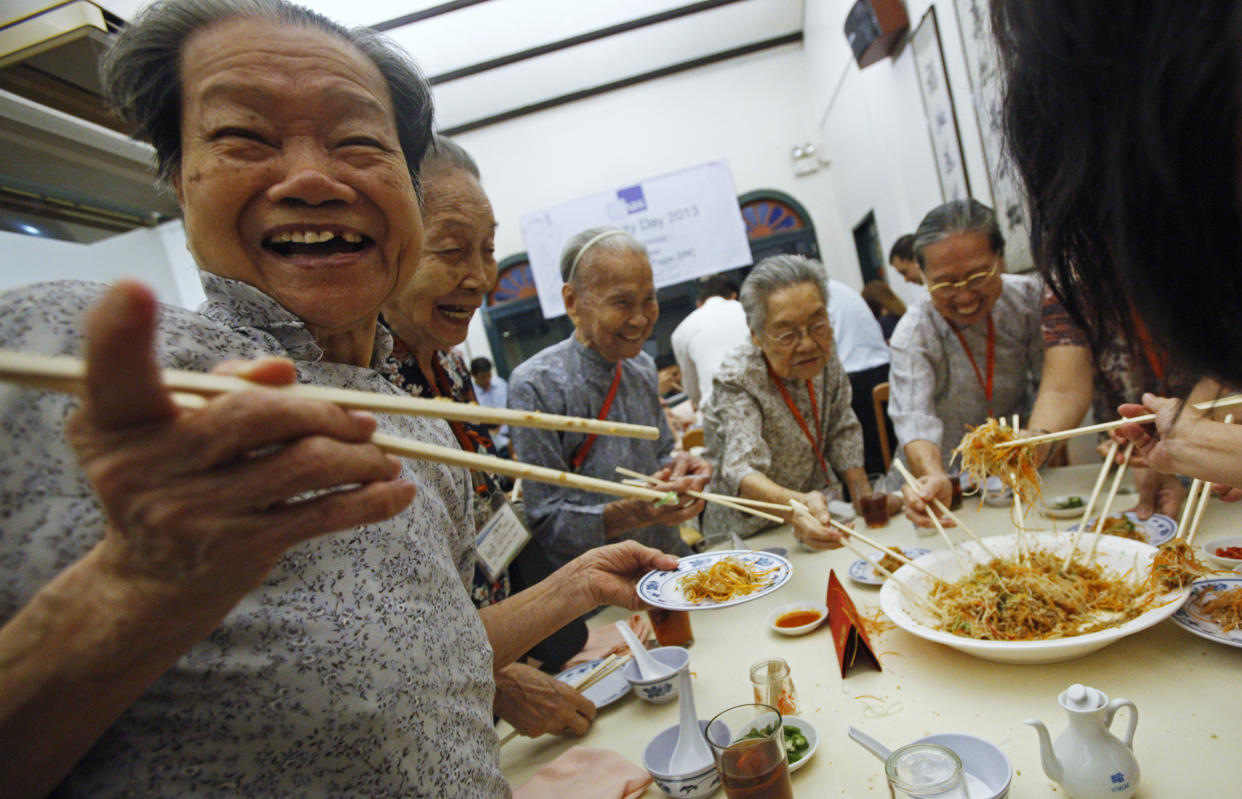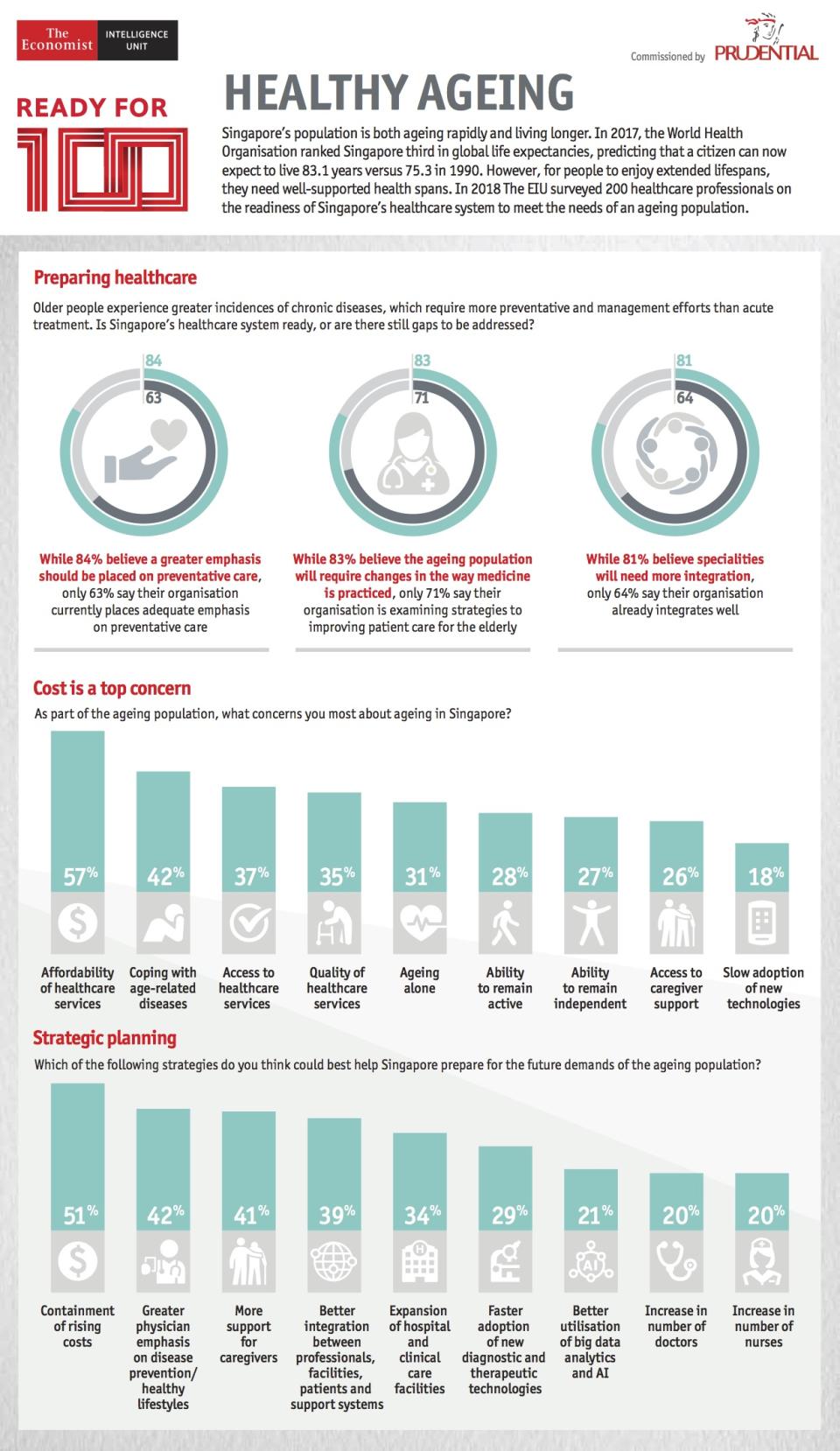Singaporeans unprepared on rising medical costs of living to 100: healthcare survey

SINGAPORE — Nearly half of healthcare practitioners in Singapore say that Singaporeans are, to some degree, unprepared for the health-related expenses of living to 100 years old, according to a survey done in 2018.
The survey findings, found in Prudential Singapore’s “Healthy for 100?” report released on Tuesday (23 July), also showed that containment of rising costs (51 per cent) was ranked by these practitioners as the top strategy to help Singapore prepare for future demands of the ageing population.
This is followed by greater physician emphasis on disease prevention and healthy lifestyles (42 per cent), more support for caregivers (41 per cent) and better integration (39 per cent).
Containing rising costs a ‘legitimate concern’
Dr Jeremy Lim, partner and head of health and life sciences (Asia Pacific) of global management consulting firm Oliver Wyman, was cited in the report as saying that containing rising costs is “a very legitimate concern”.
“Singapore, like the rest of the world, has seen healthcare inflation far outpace general inflation,” said Dr Lim, who warned that the issue can be overblown from the perspective of the patient, not the government.
Greater use of in-home medical technology could contribute to a potential solution, noted the report conducted by Economist Intelligence Unit.
Concerns about access to adequate care is also substantial: Only 51 per cent of the practitioners agree that their patients currently have access to the caregiving support that they need.
About 57 per cent agree that the cost of caregiving outside of hospitals and clinical settings is adversely affecting their patients’ access to those services, with only 26 per cent confident that their patients will have adequate access to caregiving support in 10 years’ time.

Greater emphasis on preventative care
Seventy per cent of respondents agree that residents are responsible for supporting their own healthy ageing, in line with findings that 84 per cent agree that Singapore’s health system should place greater emphasis on preventative care.
Dr Lim Wee Shiong, senior consultant at Tan Tock Seng Hospital’s Institute of Geriatrics and Active Ageing, noted that in an ageing society, “what cannot be denied is that I need to take ownership of my own health. It is not, in the end, my government’s problem”.
The reported noted that the Singapore government has nonetheless stepped up efforts around the prevention challenges associated with population ageing, such as the Ministry of Health’s 2016 “War on Diabetes”, to positive effect.
“Singaporeans have become very alert to disease prevention, especially in the last five years. More people are running than ever before. They are choosing healthier food options and counting calories,” said Dr Angelique Chan, executive director of the Centre for Ageing Research and Education and Duke-NUS Medical School.
However, survey findings indicate that, despite the progress, the picture of healthy living among Singaporeans remains ambiguous.
Between 27 and 72 per cent of respondents reported that – depending on age group and the disease in question – Singaporeans are very or fully proactive on prevention.
Young Singaporeans need to be more engaged
However, healthcare practitioners say that “a significant minority” of older Singaporeans, as well as those younger than 45, need to become more engaged in prevention.
Dr Chan noted that, even after recent improvements, “young Singaporeans are not very active in disease prevention. They do not think about ever being disabled or ill”.
She added that officials are discussing having healthy living programmes – currently focused on people in their 50s – that include younger generations, in the hope of creating a “cradle to grave” approach to prevention.
However, Tan Hwee-Pink, associate professor of Information Systems at Singapore Management University, warned that more of the same in the area of prevention may still be insufficient for younger Singaporeans.
“Despite various campaigns on reducing sugar intake, cutting down on smoking, drinking more water, and keeping an active and healthy lifestyle, obesity is increasing among our kids,” he said.
Noting that Singapore’s healthcare system typically go for “tried and tested approaches”, Tan suggested that it go for a bolder solution.
These could include copying private insurers and encouraging active lifestyles by allowing people to buy fitness devices using money in mandatory Medisave accounts, for instance, or crediting those accounts if people do a certain level of exercise daily.
Changing patients’ mindsets
Mindsets of patients must also change, said Dr Jeremy Lim, who noted that many still do not wish to be engaged in their own disease management, and go to their doctors seeking “a magic bullet”.
About 79 per cent of the medical practitioner respondents said that patients should visit their physicians to set up preventative care plans. Comparatively, only 10 per cent say patients should only visit their physicians to diagnose and treat disease.
The report said that this transition will be “far from simple”, because healthcare has to continue while new arrangements around care pathways, funding and other areas are being trialled.
To further complicate matters, issues arising as a result of ageing “are more than specifically medical ones”, says Dr Lim Wee Shiong.
The report noted that elderly individuals are at a higher risk of becoming what doctors call “frail”, where they have fewer physical, cognitive, emotional and social resources to recover from health setbacks.
Dr Lim noted that, as a result, these senior citizens “have multiple interacting issues, including functional and social ones, which make care much more complex”.
Such solutions can include providing the growing ageing population with appropriate levels of long-term, social care and support – whether at home or in specialist facilities, said the report.
More than 200 healthcare practitioners polled
The research report polled more than 200 clinicians and healthcare providers in Singapore in March last year.
Of these, 40 per cent provide their services at polyclinics or family clinics, 35 per cent provide at general hospitals, 21 per cent at community hospitals and 4 per cent at specialist hospitals or institutions.
About 79 per cent of practitioners have patients who are 50 years old and above, making up 41 to 100 per cent of their patient population.
A series of in-depth interviews with senior government officials, business executives and other experts were also conducted, along with a separate survey of 1,214 Singapore residents.
Findings released last year showed that more than half of residents surveyed (55 per cent) said that they were not ready to live to the age of 100, with less than one in three (29 per cent) wanting to do so.
The average Singaporean is expected to live to 84.8 years, with 74.2 years in good health, according to The Burden of Disease in Singapore 1990 to 2017 report, surpassing Japan (84.1 years) whose citizens traditionally live the longest.

Related stories:
Singaporeans topped world's life expectancy list at 84.8 years: study
Only 29 per cent of Singapore residents want to live to 100: survey
Eldercare workers in Singapore paid the lowest among 5 Asia Pacific economies: study



